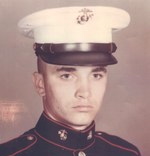Buried in Kennett Square, he was unidentified for more than four decades
By Kathleen Brady Shea, Managing Editor, The Times

State police are looking for the public’s help to solve the 1968 murder of Cpl. Robert Daniel Corriveau.
For nearly 44 years, the remains of an unidentified murder victim lay in Longwood Cemetery, but the case was never forgotten, state police said.
On July 29, 2009, members of the Pennsylvania State Police Criminal Investigation Assessment/Missing Persons Unit – assisted by the Chester County District Attorney’s Office and the Coroner’s Office – exhumed the body for DNA analysis.
Nearly three years later, the victim was identified as Cpl. Robert Daniel Corriveau, a decorated U.S. Marine. Corriveau, who had been wounded in action on three separate occasions in Vietnam in 1967. He had been killed two weeks before his 21st birthday.
In September, a Chester County judge ordered Corriveau’s remains to be exhumed again from his Kennett Square grave so that he could be re-interred with military honors in his family’s burial plot in Lawrence, Mass., according to his obituary.

State police are eager to solve the homicide of Robert Daniel Corriveau, a decorated Marine who was killed in 1968 .
Now state police, still hoping to find Corriveau’s killer, are releasing details about the case and asking for the public’s assistance. Anyone with information should call 610-268-5158 or email RA-1968MarineDeath@pa.gov. Reward money may be available through Pennsylvania Crime Stoppers at 1-800-4PA-TIPS or www.PaCrimeStoppers.org.
Investigators believe that people in the area may have information that could help solve the case, one that has seen the retirement of two of the troopers – Patrick Quigley and Thomas Waters – who refused to give up on the quest for justice, efforts that led to Corriveau’s identification.
The circumstances of the case, now being led by Trooper Henry Callithen, have angered and frustrated law enforcement. Corriveau served his country heroically and needed help reintegrating back into society. Instead, he was taken advantage of and left without even his dog tags for identification, investigators said.
Police offered this account:
On Nov. 18, 1968, a state trooper on routine turnpike patrol spotted a man in a seated position alongside the highway about a mile east of the Downingtown interchange. The trooper stopped to check on the man, who carried no identification, and found that he was deceased. An autopsy determined that the young man had been stabbed once through the heart.
After exhuming the body in 2009, investigators sent bone samples to the University of North Texas Center for Human Identification, where a DNA profile was eventually entered into a national missing persons’ DNA database. Investigators suspected the victim had military ties because of two tattoos: a bird in flight with a heart in the background and a bulldog wearing a World War I helmet the letters “USMC” below it. As a result, the U.S. Naval Criminal Investigative Service Cold Case Unit and the U.S. Marine Corps Absentee Collection Unit were contacted.
Once Corriveau was identified, investigators learned that he had been a patient at the Philadelphia Naval Hospital, where he was receiving psychiatric treatment for a combat-related condition. He was discovered missing by hospital personnel at 7:50 a.m. on Nov. 18, 1968, the same day he was found along the turnpike near Downingtown.
According to his obituary, Corriveau was born in Lawrence, Mass., on Dec. 1, 1947. He was the son of the late Phillip G. Corriveau and Kathleen Hannagan Corriveau. He enlisted in the Marine Corps on April 1, 1965. After boot camp and field combat training, he was deployed to Vietnam, where was awarded the Purple Heart and the Marine Corps Service Commendation Medal.
Anyone with information should call 610-268-5158 or email RA-1968MarineDeath@pa.gov. Investigators are particularly interested in speaking with anyone who may have served with Corriveau or interacted with him at the Philadelphia Naval Hospital in October and November 1968.
Reward money may be available through Pennsylvania Crime Stoppers at 1-800-4PA-TIPS or www.PaCrimeStoppers.org.






